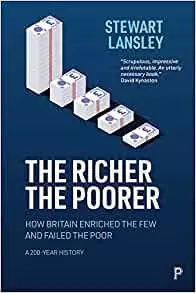The Richer, The Poorer
Stewart Lansley
"The Richer, The Poorer: How Britain Enriched the Few and Failed the Poor. A 200-Year History", Stewart Lansley
Stewart Lansley delivers a rich, deeply researched chronicle of poverty and inequality in the UK over the last 200 years. It’s very readable, very interesting, and packed with exhaustive and almost exhausting detail. Lansley seeks to present his version of this story as evidence of ‘extractive capitalism’. The poor are poor because the rich grasp all the returns of the capitalist economy. His presentation is largely by myriad examples, rather than by the causal econometric analysis which is needed to prove his case.
There are important definitional and analytical gaps in Lansley’s presentation. His definition of ‘extractive capitalism’ is ‘a more generic description of economies that allow an elite of capital owners and executives to secure an excessive slice of the economic cake’ (p19) which becomes tautologous when it is taken to explain inequality. Lansley’s basic but unproven theory is that the reduction in labour bargaining power either causes or is caused by, extractive capitalism (p20). He assumes fundamental and necessary conflict between labour and capital, slightly moderated in the immediate post-war economy, but this is simply stated rather than resulting from any data analytic.
The exact definition of inequality is any position other than exact equality. But this definition faces Aristotle’s challenge famously paraphrased by Thomas Jefferson that, ‘There is nothing more unequal than the equal treatment of unequal people’. Lansley doesn’t define what level of inequality, by what cause, breaches the requirement of social justice. He does discuss Tawney, Titmuss and Crosland on in/equality (p121) but doesn’t arrive at any definitive conclusion.
Similarly in defining poverty, the question of relative or absolute definitions arises, which Lansley discusses but doesn’t unambiguously determine. Even the criterion of social justice is elusive definitionally, as Amartya Sen shows in his ‘The Idea of Justice’ where the just ownership of a flute between the child who made it, a child who has no other toys, and a child who can play it is not capable of objective definition. He also doesn’t define exactly what he means by capitalism – is it the operation of a private sector market, the private ownership of the means of production, some level of concentration of market share, or some threshold level of dividend compared to wage? Lansley needs to establish a philosophy for these definitions which are necessary interpreters of his account.
He doesn’t develop a theory of extractive capitalism. Whilst there are historic periods and specific contemporary exemplars of extractive capitalism, this does not necessarily render capitalism per se generically extractive as Lansley implies, apart from during a short-lived post-war period. Many would claim that there are socially responsible variants of a private sector economy. Apart from referring to labour bargaining power, Lansley fails to demonstrate a causal connection between a model of capitalism and the phenomena of inequality and poverty. He doesn’t refer to alternative claims that technology and automation are responsible for reducing labour income in the economy, thereby requiring alternative income schemes such as a basic income, which curiously Lansley advocates elsewhere but not in this book, apart from a veiled reference by another name (p245-246).
As Lansley says, Keynes believed capitalism’s faults could be rectified, whilst Marx thought not and advocated or predicted its demise. Keynesian rectification proved more effective and socially and politically preferable. Lansley’s own closing proposals are to target a reduced Palma (which he prefers to Gini) inequality ratio of 1.25 over 10 years by means such as more progressive taxation, universal free services, a wealth tax and wealth fund, the return of natural resources to ‘the commons’, and reformed corporate behaviour (p234,244). This is all simply stated without supporting impact and implication analysis, and therefore without convincing argument.
We do face huge levels of inequality, and substantial poverty, including within work, and crippling levels of both household and government debt. A basic income funded by debt-free sovereign money does offer a consistent remedial paradigm.
The book is available here.
Geoff Crocker
Editor ‘The Case for Universal Basic Income'
www.ubi.org

